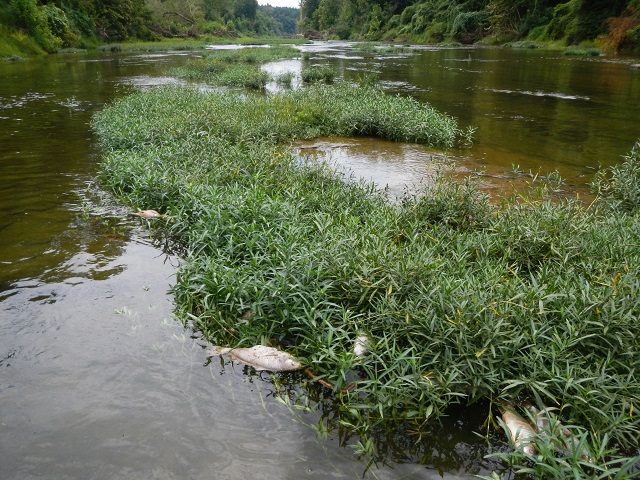MONTGOMERY – The Alabama Department of Environmental Management (ADEM) said on Tuesday it has concluded its investigation into the release of hundreds of gallons of sulfuric acid from American Proteins in Hanceville last Wednesday that reached the Mulberry Fork resulting in a fish kill.
“While individuals on the river may observe remaining dead fish,” said ADEM’s Jerome Hand, “data collected for this section of the river indicates that the water quality has returned to pre-spill conditions.”
It was reported by ADEM last week that 900 gallons of sulfuric acid had been spilled into the Mulberry Fork on Wednesday, Aug. 17 at the American Proteins facility located in Hanceville.
The next day, Thursday, the president of American Proteins, Mark Ham, told The Tribune, “On Wednesday, Aug. 17, 2016, the company’s Hanceville facility experienced a spill from its sulfuric acid tank. The company promptly notified the appropriate agencies and has been working closely with them in addressing this spill. The spilled sulfuric acid was contained; however, due to the nature of the spilled material, the containment system failed and a small portion of this material along with storm water was spilled into a tributary of the (Black) Warrior River. The company estimates that approximately 150 gallons of sulfuric acid along with 750 gallons of storm water was spilled into the tributary. The company took immediate steps and stopped the flow of the spill. The company is also taking steps to ensure that this type of spill does not occur in the future. The company continues to coordinate with those agencies."
Black Warrior Riverkeeper (BWR), a nonprofit whose mission is to protect and restore the Black Warrior River and its tributaries, was quick to respond to the spill.
BWR’s Nelson Brooke said, “American Proteins’ chicken rendering plant on the Mulberry Fork is a massive facility. It is right next to the river, just upstream of I-65. This sort of accident is inexcusable, and totally preventable. Proper housekeeping, maintenance, spill control planning should keep something like this from ever happening. This is not American Proteins’ first mishap on the river. In May of 2011 they spilled 1.6 million gallons of wastewater into the river. We expect American Proteins to be held fully accountable by state regulators. DCNR counted the fish, and can – and should – levy a fine based upon their investigation expenses and the economic valuation of the dead fish. ADEM can – and should – fine American Proteins for spilling hundreds of gallons (of) sulfuric acid into the Mulberry Fork, to encourage better housekeeping and to deter future mishaps.”
When asked about Ham’s statement than only 150 gallons of acid were spilled, Brooke responded, “That is indicative of him being out of touch with the harm that can be done to a living river. Whether it was 900 or 150 gallons, it was clearly enough to kill those fish. There’s nothing he can say to diminish what happened.”
Hand says that ADEM has been in contact with the Alabama Department of Conservation and Natural Resources (ADCNR), which has assessed the extent of the fish kill, and will be providing its report to the ADEM.
“ADEM is in the process of gathering all of the information and reviewing the data that has been collected,” said Hand.
The exact number of fish killed will not be known until the ADCNR report is released.
“It has been almost a week since the spill,” said Brooke. “The acid has now been flushed downstream and become a part of the river system. Once the harm is done, it’s done.”
American Proteins is facing possible fines from both ADEM and ADCNR.
Copyright 2016 Humble Roots, LLC. All Rights Reserved.




























